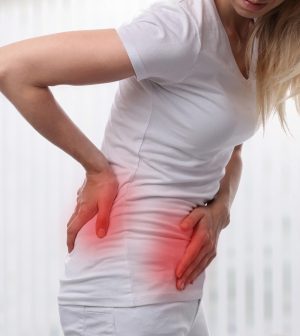- Could Your Grocery Store Meat Be Causing Recurring UTIs?
- Are You Making This Expensive Thermostat Error This Winter?
- Recognizing the Signs of Hypothyroidism
- 10 Strategies to Overcome Insomnia
- Could Artificial Sweeteners Be Aging the Brain Faster?
- Techniques for Soothing Your Nervous System
- Does the Water in Your House Smell Funny? Here’s Why
- Can a Daily Dose of Apple Cider Vinegar Actually Aid Weight Loss?
- 6 Health Beverages That Can Actually Spike Your Blood Sugar
- Treatment Options for Social Anxiety Disorder
Your Microbiome Could Be Setting You Up for Kidney Stones

The pain of kidney stones seemingly arises out of nowhere, but new research suggests the body’s microbiomes might help create the noxious granules.
In the Canadian study, people who had kidney stones appeared to share certain changes in the microbiomes of their gut, urinary tract and saliva that weren’t found in folks without stones.
“We found not only that those who got kidney stones had an unhealthy microbiome, including a gut microbiome that was more likely to excrete toxins to the kidneys, but also that they were antibiotic-resistant,” said study senior author Dr. Jeremy Burton, a scientist at the Lawson Health Research Institute and research chair of human microbiome and probiotics at St. Joseph’s Health Care London, in London, Ontario.
Burton’s group published their findings recently in the journal Microbiome.
His team examined the microbial makeup of the gut, urinary and saliva microbiomes of 83 people who’d had a kidney stone and 30 folks who never had one.
Study lead author Dr. Kait Al said cutting-edge analytical tools “allowed us to discover which bacteria were present in the gut and the genetic capabilities of those bacteria, or how it functions. We also did a simpler sequencing [examination] of the oral and urinary samples.”
Al is a postdoctoral research fellow at the Schulich School of Medicine & Dentistry at the University of Western Ontario, also in London, Ontario.
Most kidney stones are formed from one of the body’s waste products, calcium oxalate. Some microbiomes naturally contain a bacterium called Oxalobacter formigenes, which can break down oxalate. But the new research suggests other factors at play in the microbiome.
“It’s a more complex story,” Al said in a Lawson news release. “The microbes form a kind of network that’s stable and beneficial in healthy people, but in those with kidney stones, that network is broken down. They’re not producing the same vitamins and useful metabolites, not just in the gut but also in the urinary tract and oral cavity.”
Overexposure to antibiotics might play a part in kidney stone risk, as well.
Eating healthy and avoiding antibiotics (when you can) might work together to boost your microbiome’s health and ward off kidney stones, the research team said.
More information
Find out more about kidney stones at the Mayo Clinic.
SOURCE: Lawson Health Research Institute, news release, Dec. 20, 2023
Source: HealthDay
Copyright © 2026 HealthDay. All rights reserved.










